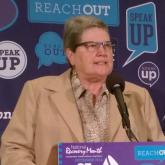WASHINGTON – With more adolescents reporting a major depressive episode and the number of adults with any mental illness holding steady, SAMHSA Administrator Pamela S. Hyde said new approaches are needed.
"America needs to think about behavioral health differently, about addictions and mental illness and people who experience them differently," Ms. Hyde of the Substance Abuse and Mental Health Services Administrationsaid during a Sept. 4 press conference held to review key results of the 2013 National Survey on Drug Use and Health (NSDUH).
"Social norms about these illnesses have to change," she said. "The role of behavioral health of our communities, our families, and in ourselves has to change. The public’s commitment to and financial support for prevention, treatment, and recovery has to change, or else we are going to keep meeting here every fall ... giving the same numbers and showing the same problems."
NSDUH, an annual survey sponsored by SAMHSA, tracks illicit drug use and mental health issues in the United States for people aged 12 years and older. The agency plans to release the full report in the coming weeks.
To underscore the need for a different approach, Ms. Hyde highlighted two statistics on mental health from the 2013 survey – that more than 2.6 million adolescents (aged 12-17 years) experienced a major depressive episode (MDE) at some point in the 12 months prior to taking it. An MDE, defined using DSM-IV criteria, is a period of 2 weeks or longer when a depressed mood or loss of interest or pleasure in daily activities persists for this age group. In addition, the adolescent had at least four of seven additional symptoms, such as problems with sleeping, eating, energy, concentration, and self-worth. That number was up from the 2.5 million estimated to have had an MDE in the 2012 survey.
About 38% of adolescents with past-year MDE received treatment in 2013; that percentage climbed to 45% for those who had MDE with severe impairment. The survey defined treatment as talking with or seeing a doctor or other professional, or using prescription medication.
Part of the problem is simply recognizing the problem.
"This is one of the most common mental health issues among adolescents, and it’s treatable with the appropriate recognition and engagement with a trained health or behavioral health practitioner," Ms. Hyde said, noting that the normal challenges of being an adolescent can be confused with depression. Part of our work and effort is to help young people, teachers, and parents to understand the difference between a depressive episode and "the normal vagaries of adolescence," she said.
For adults aged 18 years and older with any mental illness not related to alcohol or drug use, the rate was about one in five, consistent between the 2012 and 2013 surveys. Among the 43.8 million adults in 2013 who had any mental illness, about 19.6 million received mental health services treatment. Among the 10 million adults with serious mental illness, about 68.5% received mental health services.
"So even with serious mental conditions or any mental illness with serious impairments or major depressive episodes with severe impairment, we are not getting people to the treatment they need," Ms. Hyde said, adding that the 18.5% of adults having any mental illness is greater than the 11.3% of adults diagnosed with heart disease.
gtwachtman@frontlinemedcom.com
Do you screen teens in your practice for major depressive disorder? Take our quick poll on the Pediatric News homepage.
